Scientific/Clinical Workshop: Intuitive Bidirectional Control of Bionic Limbs: Bridging across Academia, Clinics, and Industry
Join us at Rehabweek 2022 and ICORR 2022 in Rotterdam, the Netherlands
Where: Rotterdam Ahoy, Rotterdam, The Netherlands
When: Monday, July 25th
Developing successful bionic limb technologies is an endeavour that needs a deep understanding of diverse aspects spanning from rehabilitation medicine to biomechanics, engineering, and technology transfer. For such innovations to have a true impact in society, it is necessary to consider not only new scientific and technological ideas, but also the requirements of all stakeholders (e.g., healthcare system, clinicians, regulatory agencies, producers, etc.), as well as business-related factors (e.g., operation cost, market placement, etc.). This hands-on workshop discusses the development of next-generation bionic limb technologies in the context of three major aspects: scientific advances, clinical translation, and industrial exploitation. The workshop is organized in two 90-minute slots. The first slot provides talks from eight internationally recognised scientific, clinical, and industrial leaders in the field. The scheduled talks will present latest scientific advances in mechatronic design, control, and sensory feedback towards the creation of powered prostheses that operate as an extension of the human body. That is, the prostheses that are controlled by the human nervous system and provide sensory feedback to the amputee to enhance proprioception and embodiment. The second slot is framed as a hands-on demonstration session where participants can freely move across five DEMO boots. Each boot will provide live DEMOs of bionic limb-related technologies including powered prosthetic legs, real-time myoelectric musculoskeletal models for control, and real-time somatosensory feedback technologies. The proposed setting will move the workshop beyond the classical presentation-based paradigm and it will provide direct insights into relevant bionic limb-related problems and solutions.
Program:
| 08:15 - 08:20 | Introduction by Jose Gonzalez |
| 08:20 - 08:30 | Title: New developments in lower limb prosthetics; what is the evidence? An outlook in 2021’s Dutch multidisciplinary guideline
Speaker: Hans Rietman
|
| 08:30 - 08:40 | Title: Artificial Sensory Feedback: from humans to bionics
Speaker: Strahinja Dosen |
| 08:40 - 08:50 | Title: Towards balance control in prosthesis founded on physiological inspired mechanistic models
Speaker: Herman van der Kooij |
| 08:50 - 09:10 | Title: The Open Source Leg v2
Speaker: Elliott Rouse |
| 09:10 - 09:30 | Title: Design and Control of an MPK with Powered Swing and Stance Assistance
Speaker: Michael Goldfarb |
| 09:30 - 09:50 | Title: Adaptive Volitional Control for Robotic Leg Prosthesis in the Real World
Speaker: Tommaso Lenzi |
| 09:50 - 10:10 | Break |
| 10:10 - 11:30 | Demo |
| 11:30 - 12:00 | Panel Discussion |
Speakers:
Jose Gonzalez, OttoBock HealthCare (DE)  Jose Gonzalez-Vargas is currently an Innovation and Research Manager of Global Research at Ottobock SE & KGaA. Within this role he is in charge of finding and translating novel ideas into successful products. He is overseeing several projects in the field of lower limb Prosthetics and Exoskeletons for the healthcare and manufacturing domains. He is also the coordinator of the EU project SimBionics and PI for several other EU and German funded projects. He obtained a degree in Electronic Engineering Technology Institute of Costa Rica, focused on embedded systems and automatic control. He obtained the master degree in Artificial System Engineering (2009) and a PhD in Medical System Engineering (2012) in the laboratory of Bio-robotics Assistive Devices from Chiba University, Japan. In 2006 he was granted Japan’s MEXT scholarship and in 2010 he was granted the JSPS young research fellowship. In 2013 he was a postdoc fellow researcher in the Research Center for Frontier Medical Engineering in Chiba University, as well as a visiting researcher in the Neuro-rehabilitation department of the Medical University of Göttingen chaired at that time by Prof. Dario Farina. From 2013 – 2017, he worked as a Research Fellow in the Neural Rehabilitation group of the Cajal institute in the Spanish National Research Council in Spain, where he was involved in numerous funded research projects.
Jose Gonzalez-Vargas is currently an Innovation and Research Manager of Global Research at Ottobock SE & KGaA. Within this role he is in charge of finding and translating novel ideas into successful products. He is overseeing several projects in the field of lower limb Prosthetics and Exoskeletons for the healthcare and manufacturing domains. He is also the coordinator of the EU project SimBionics and PI for several other EU and German funded projects. He obtained a degree in Electronic Engineering Technology Institute of Costa Rica, focused on embedded systems and automatic control. He obtained the master degree in Artificial System Engineering (2009) and a PhD in Medical System Engineering (2012) in the laboratory of Bio-robotics Assistive Devices from Chiba University, Japan. In 2006 he was granted Japan’s MEXT scholarship and in 2010 he was granted the JSPS young research fellowship. In 2013 he was a postdoc fellow researcher in the Research Center for Frontier Medical Engineering in Chiba University, as well as a visiting researcher in the Neuro-rehabilitation department of the Medical University of Göttingen chaired at that time by Prof. Dario Farina. From 2013 – 2017, he worked as a Research Fellow in the Neural Rehabilitation group of the Cajal institute in the Spanish National Research Council in Spain, where he was involved in numerous funded research projects.
Johan Rietman, Roessingh Research and Development (NL)  Prof. J.S. (Hans) Rietman MD, PhD is physiatrist and professor in Rehabilitation Medicine & Technology at the University of Twente. He performs his clinical work as a rehabilitation physician at Roessingh Center for Rehabilitation. He is also appointed at the research institute Roessingh Research and Development and member of the Biomedical Technological Institute of the University of Twente and adjunct professor at Northwestern University Chicago.In 2014, he became president of the Netherlands Society of Rehabilitation Medicine (NSRM). His research focuses on the clinical use of technology in restoration of functions in patients with neurological disorders and patients with amputations of upper and lower extremities. He is actively involved in a diversity of (inter-) national projects focusing on Rehabilitation Robotics and Active Assistive Devices. In 2016 he became medical director of the Center of research excellence Innovative Medical Devices Initiative (IMDI) SPRINT and since 2018 he is leader of this national program IMDI 2.0. He is co-editor of the Dutch book of Rehabilitation Medicine for adults and the Dutch book of Amputation and Prosthetics of the lower extremities and (co)author of more than 100 Pubmed cited articles. H-Index: 34 (Google Scholar)
Prof. J.S. (Hans) Rietman MD, PhD is physiatrist and professor in Rehabilitation Medicine & Technology at the University of Twente. He performs his clinical work as a rehabilitation physician at Roessingh Center for Rehabilitation. He is also appointed at the research institute Roessingh Research and Development and member of the Biomedical Technological Institute of the University of Twente and adjunct professor at Northwestern University Chicago.In 2014, he became president of the Netherlands Society of Rehabilitation Medicine (NSRM). His research focuses on the clinical use of technology in restoration of functions in patients with neurological disorders and patients with amputations of upper and lower extremities. He is actively involved in a diversity of (inter-) national projects focusing on Rehabilitation Robotics and Active Assistive Devices. In 2016 he became medical director of the Center of research excellence Innovative Medical Devices Initiative (IMDI) SPRINT and since 2018 he is leader of this national program IMDI 2.0. He is co-editor of the Dutch book of Rehabilitation Medicine for adults and the Dutch book of Amputation and Prosthetics of the lower extremities and (co)author of more than 100 Pubmed cited articles. H-Index: 34 (Google Scholar)
Strahinja Dosen, Aalborg University (DK) 
Strahinja Dosen received the Diploma of Engineering in electrical engineering and the M.Sc. degree in biomedical engineering in 2000 and 2004, respectively, from the Faculty of Technical Sciences, University of Novi Sad, Serbia, and the Ph.D. degree in biomedical engineering from the Center for Sensory-Motor Interaction (SMI), Aalborg University, Aalborg, Denmark, in 2008. Until 2011, Dr. Dosen was an Assistant Professor at SMI. Between 2011 and 2017, he was working as a Research Scientist at the Institute for Neurorehabilitation Systems, University Medical Center Gottingen, Germany. Currently, he is an Associate Professor at the Department of Health Science and Technology (HST), Aalborg University (AAU), Denmark, where he leads a research group on Neurorehabilitation Systems (https://www.neurorehabsystems.aau.dk/). Dr. Dosen is a principal investigator for AAU and HST in several EU (Tactility, Wearplex, Sixthsense and SimBionics) and nationally (Robin and Remap) funded projects. He has published more than 80 manuscripts in peer reviewed journals. His main research interest is in the closed-loop control of movements and assistive systems, including human-machine interfacing, control of bionic limbs and rehabilitation robotics, artificial sensory feedback, and functional electrical stimulation. He is a member of the IEEE Engineering in Medicine and Biology Society.
Herman van der Kooij, University of Twente (NL) 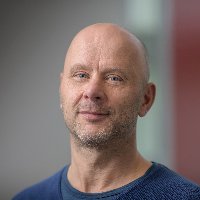 Prof. Dr. ir. Herman van der Kooij, chairs the BioMechatronics group. He received his Phd with honors (cum laude) in 2000 and is professor in Biomechatronics and Rehabilitation Technology at the Department of Biomechanical Engineering at the University of Twente (0.8 fte), and Delft University of Technology (0.2fte), the Netherlands. His expertise and interests are in the field of human balance and motor control, adaptation, and learning. He combines experiments with neuro-mechanical models. His group designed various rehabilitation, wearable robots, diagnostic, and assistive robotics. Examples are the gait rehabilitation robot LOPES and the Mindwalker wearable exoskeleton. He has published over 170 peer-reviewed publications in the area of biomechatronics and human motor control. He is frequently invited as (keynote) speaker at international conferences. He received several award, among were the prestigious Dutch VIDI and VICI personnel grants for excellent researchers in 2001 and 2015 respectively. He is associate editor of IEEE TBME and IEEE Robotics and Automation Letters, member of IEEE EMBS technical committee of Biorobotics and of the advisory board of the IEEE conference BIOROB, chair of the IEEE BIOROB2018 and ICORR2022 conference, and was member of numerous scientific program committees in the field of rehabilitation robotics, bio robotics, and assistive devices. He participated in seven EU projects and was the coordinator of the European FP7 project Symbitron. Currently he leads the Dutch national program Wearable Robotics and the Dutch national 4TU Soft Robotics program.
Prof. Dr. ir. Herman van der Kooij, chairs the BioMechatronics group. He received his Phd with honors (cum laude) in 2000 and is professor in Biomechatronics and Rehabilitation Technology at the Department of Biomechanical Engineering at the University of Twente (0.8 fte), and Delft University of Technology (0.2fte), the Netherlands. His expertise and interests are in the field of human balance and motor control, adaptation, and learning. He combines experiments with neuro-mechanical models. His group designed various rehabilitation, wearable robots, diagnostic, and assistive robotics. Examples are the gait rehabilitation robot LOPES and the Mindwalker wearable exoskeleton. He has published over 170 peer-reviewed publications in the area of biomechatronics and human motor control. He is frequently invited as (keynote) speaker at international conferences. He received several award, among were the prestigious Dutch VIDI and VICI personnel grants for excellent researchers in 2001 and 2015 respectively. He is associate editor of IEEE TBME and IEEE Robotics and Automation Letters, member of IEEE EMBS technical committee of Biorobotics and of the advisory board of the IEEE conference BIOROB, chair of the IEEE BIOROB2018 and ICORR2022 conference, and was member of numerous scientific program committees in the field of rehabilitation robotics, bio robotics, and assistive devices. He participated in seven EU projects and was the coordinator of the European FP7 project Symbitron. Currently he leads the Dutch national program Wearable Robotics and the Dutch national 4TU Soft Robotics program.
Elliott Rouse, University of Michigan (USA) 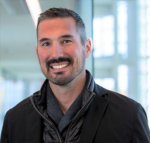 Elliott Rouse is an Assistant Professor in the Department of Mechanical Engineering and a Core Faculty Member in the Robotics Institute at the University of Michigan. He directs the Neurobionics Lab, whose vision is to reverse engineer how the nervous system regulates the mechanics of locomotion, and use this information to develop better wearable robotic technologies. He is the recipient of the NSF CAREER Award and is a member of the IEEE EMBS Technical Committee on BioRobotics. In addition, he is on the Editorial Boards for IEEE Robotics and Automation Letters, IEEE Transactions on Biomedical Engineering, and Wearable Technologies. Elliott received the BS degree in mechanical engineering from The Ohio State University and the PhD degree in biomedical engineering from Northwestern University. Subsequently, he joined the Massachusetts Institute of Technology as a Postdoctoral Fellow in the MIT Media Lab. Prior to joining the University of Michigan, Elliott was faculty in the Schools of Medicine and Engineering at Northwestern University and worked in professional autoracing. In 2019 – 2020, he was a visiting faculty member at (Google) X, where he maintains an appointment. Elliott and his research have been featured at TED, on the Discovery Channel, CNN, Digital Trends, Business Insider, among others.
Elliott Rouse is an Assistant Professor in the Department of Mechanical Engineering and a Core Faculty Member in the Robotics Institute at the University of Michigan. He directs the Neurobionics Lab, whose vision is to reverse engineer how the nervous system regulates the mechanics of locomotion, and use this information to develop better wearable robotic technologies. He is the recipient of the NSF CAREER Award and is a member of the IEEE EMBS Technical Committee on BioRobotics. In addition, he is on the Editorial Boards for IEEE Robotics and Automation Letters, IEEE Transactions on Biomedical Engineering, and Wearable Technologies. Elliott received the BS degree in mechanical engineering from The Ohio State University and the PhD degree in biomedical engineering from Northwestern University. Subsequently, he joined the Massachusetts Institute of Technology as a Postdoctoral Fellow in the MIT Media Lab. Prior to joining the University of Michigan, Elliott was faculty in the Schools of Medicine and Engineering at Northwestern University and worked in professional autoracing. In 2019 – 2020, he was a visiting faculty member at (Google) X, where he maintains an appointment. Elliott and his research have been featured at TED, on the Discovery Channel, CNN, Digital Trends, Business Insider, among others.
Michael Goldfarb, Vanderbilt University (USA)  Dr. Goldfarb has authored more than 250 publications and been awarded over 40 US patents on topics related to wearable robotics. Dr. Goldfarb was recognized by Stanford University as among the Top 2% of Most Cited Scientists in 2021, and also in the Top 2% of Most Cited Scientists in the Career-long category. Among his papers were ones awarded best-paper awards in 1997, 1998, 2003, 2007, 2009, 2013, and 2020, and papers that were finalists for best paper awards in 2015 and 2017. Research interests includes the development of robotic limbs for upper and lower extremity amputees, and the development of exoskeletons for individuals with spinal cord injury and stroke, including the development of a lower limb exoskeleton now sold as the Indego exoskeleton. Dr. Goldfarb was inducted into the US National Academy of Inventors in 2020.
Dr. Goldfarb has authored more than 250 publications and been awarded over 40 US patents on topics related to wearable robotics. Dr. Goldfarb was recognized by Stanford University as among the Top 2% of Most Cited Scientists in 2021, and also in the Top 2% of Most Cited Scientists in the Career-long category. Among his papers were ones awarded best-paper awards in 1997, 1998, 2003, 2007, 2009, 2013, and 2020, and papers that were finalists for best paper awards in 2015 and 2017. Research interests includes the development of robotic limbs for upper and lower extremity amputees, and the development of exoskeletons for individuals with spinal cord injury and stroke, including the development of a lower limb exoskeleton now sold as the Indego exoskeleton. Dr. Goldfarb was inducted into the US National Academy of Inventors in 2020.
Tommaso Lenzi, University of Utah (USA) 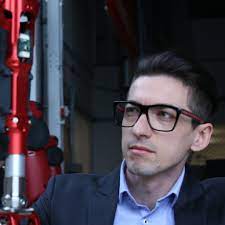
Tommaso Lenzi received the MS degree in Biomedical Engineering from the University of Pisa in 2008, and the PhD degree in BioRobotics from Scuola Superiore Sant’Anna in 2013. He is currently an Assistant Professor in the Department of Mechanical Engineering at the University of Utah, and a Core Faculty in the Utah Robotics Center. Previously, he was Research Scientist at the Rehabilitation Institute of Chicago (2015-2016), and a Postdoctoral Fellow at Northwestern University (2013-2014). He is a member of IEEE, the Robotics and Automation Society (RAS), and the Engineering in Medicine and Biology Society(EMBS). Dr. Lenzi received the NSF CAREER Award in 2021. He has co-authored more than 50 peer-reviewed scientific publications, three book chapters, and 9 patents. He serves as Associate Editor for IEEE Robotics and Automation Letters, the International Conferences on Rehabilitation Robotics (ICORR), and Biomedical Robotics and Biomechatronics (BIOROB). His main research interests include robotics, mechatronics, and rehabilitation medicine with a major emphasis on the design and control of wearable robots for human assistance and rehabilitation.
Demo:
Real-time neuromusculoskeletal model Presented by Guillaume Durandau, Federica Damonte, Lucas Avanci Gaudio and Huawei Wang, The university of Twente (NL)
Sensory feedback for prosthesis 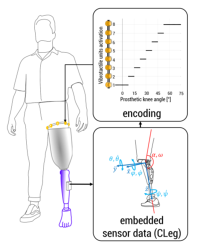 Allowing a person with a lower-limb amputation to receive sensory information from their prosthesis might improve walking performance, stability, confidence in the device as well as the feeling of embodiment. Within the SimBionics project, we are developing non-invasive vibrotactile feedback techniques to provide information from the embedded sensors of a commercial prosthesis (C-Leg – Ottobock). In this demonstration, we will present different feedback schemes that are considered in our project.
Allowing a person with a lower-limb amputation to receive sensory information from their prosthesis might improve walking performance, stability, confidence in the device as well as the feeling of embodiment. Within the SimBionics project, we are developing non-invasive vibrotactile feedback techniques to provide information from the embedded sensors of a commercial prosthesis (C-Leg – Ottobock). In this demonstration, we will present different feedback schemes that are considered in our project.
Presented by Romain Valette, Aalborg University (DEN)
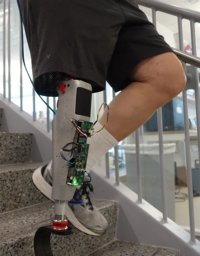 New prosthesis design.
New prosthesis design.
Presended by Dr. Goldfarb, Vanderbilt University, USA
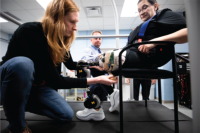 Open source knee-ankle prosthesis presented by Dr. Rouse
Open source knee-ankle prosthesis presented by Dr. Rouse
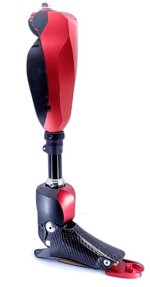 A lightweight Robotic Leg Prosthesis Replicating the Biomechanical Functions of the Human Knee, Ankle, and Toe Joint presented by Dr. Lenzi.
A lightweight Robotic Leg Prosthesis Replicating the Biomechanical Functions of the Human Knee, Ankle, and Toe Joint presented by Dr. Lenzi.

 Jose Gonzalez-Vargas is currently an Innovation and Research Manager of Global Research at Ottobock SE & KGaA. Within this role he is in charge of finding and translating novel ideas into successful products. He is overseeing several projects in the field of lower limb Prosthetics and Exoskeletons for the healthcare and manufacturing domains. He is also the coordinator of the EU project SimBionics and PI for several other EU and German funded projects. He obtained a degree in Electronic Engineering Technology Institute of Costa Rica, focused on embedded systems and automatic control. He obtained the master degree in Artificial System Engineering (2009) and a PhD in Medical System Engineering (2012) in the laboratory of Bio-robotics Assistive Devices from Chiba University, Japan. In 2006 he was granted Japan’s MEXT scholarship and in 2010 he was granted the JSPS young research fellowship. In 2013 he was a postdoc fellow researcher in the Research Center for Frontier Medical Engineering in Chiba University, as well as a visiting researcher in the Neuro-rehabilitation department of the Medical University of Göttingen chaired at that time by Prof. Dario Farina. From 2013 – 2017, he worked as a Research Fellow in the Neural Rehabilitation group of the Cajal institute in the Spanish National Research Council in Spain, where he was involved in numerous funded research projects.
Jose Gonzalez-Vargas is currently an Innovation and Research Manager of Global Research at Ottobock SE & KGaA. Within this role he is in charge of finding and translating novel ideas into successful products. He is overseeing several projects in the field of lower limb Prosthetics and Exoskeletons for the healthcare and manufacturing domains. He is also the coordinator of the EU project SimBionics and PI for several other EU and German funded projects. He obtained a degree in Electronic Engineering Technology Institute of Costa Rica, focused on embedded systems and automatic control. He obtained the master degree in Artificial System Engineering (2009) and a PhD in Medical System Engineering (2012) in the laboratory of Bio-robotics Assistive Devices from Chiba University, Japan. In 2006 he was granted Japan’s MEXT scholarship and in 2010 he was granted the JSPS young research fellowship. In 2013 he was a postdoc fellow researcher in the Research Center for Frontier Medical Engineering in Chiba University, as well as a visiting researcher in the Neuro-rehabilitation department of the Medical University of Göttingen chaired at that time by Prof. Dario Farina. From 2013 – 2017, he worked as a Research Fellow in the Neural Rehabilitation group of the Cajal institute in the Spanish National Research Council in Spain, where he was involved in numerous funded research projects. Prof. J.S. (Hans) Rietman MD, PhD is physiatrist and professor in Rehabilitation Medicine & Technology at the University of Twente. He performs his clinical work as a rehabilitation physician at Roessingh Center for Rehabilitation. He is also appointed at the research institute Roessingh Research and Development and member of the Biomedical Technological Institute of the University of Twente and adjunct professor at Northwestern University Chicago.In 2014, he became president of the Netherlands Society of Rehabilitation Medicine (NSRM). His research focuses on the clinical use of technology in restoration of functions in patients with neurological disorders and patients with amputations of upper and lower extremities. He is actively involved in a diversity of (inter-) national projects focusing on Rehabilitation Robotics and Active Assistive Devices. In 2016 he became medical director of the Center of research excellence Innovative Medical Devices Initiative (IMDI) SPRINT and since 2018 he is leader of this national program IMDI 2.0. He is co-editor of the Dutch book of Rehabilitation Medicine for adults and the Dutch book of Amputation and Prosthetics of the lower extremities and (co)author of more than 100 Pubmed cited articles. H-Index: 34 (Google Scholar)
Prof. J.S. (Hans) Rietman MD, PhD is physiatrist and professor in Rehabilitation Medicine & Technology at the University of Twente. He performs his clinical work as a rehabilitation physician at Roessingh Center for Rehabilitation. He is also appointed at the research institute Roessingh Research and Development and member of the Biomedical Technological Institute of the University of Twente and adjunct professor at Northwestern University Chicago.In 2014, he became president of the Netherlands Society of Rehabilitation Medicine (NSRM). His research focuses on the clinical use of technology in restoration of functions in patients with neurological disorders and patients with amputations of upper and lower extremities. He is actively involved in a diversity of (inter-) national projects focusing on Rehabilitation Robotics and Active Assistive Devices. In 2016 he became medical director of the Center of research excellence Innovative Medical Devices Initiative (IMDI) SPRINT and since 2018 he is leader of this national program IMDI 2.0. He is co-editor of the Dutch book of Rehabilitation Medicine for adults and the Dutch book of Amputation and Prosthetics of the lower extremities and (co)author of more than 100 Pubmed cited articles. H-Index: 34 (Google Scholar)
 Prof. Dr. ir. Herman van der Kooij, chairs the BioMechatronics group. He received his Phd with honors (cum laude) in 2000 and is professor in Biomechatronics and Rehabilitation Technology at the Department of Biomechanical Engineering at the University of Twente (0.8 fte), and Delft University of Technology (0.2fte), the Netherlands. His expertise and interests are in the field of human balance and motor control, adaptation, and learning. He combines experiments with neuro-mechanical models. His group designed various rehabilitation, wearable robots, diagnostic, and assistive robotics. Examples are the gait rehabilitation robot LOPES and the Mindwalker wearable exoskeleton. He has published over 170 peer-reviewed publications in the area of biomechatronics and human motor control. He is frequently invited as (keynote) speaker at international conferences. He received several award, among were the prestigious Dutch VIDI and VICI personnel grants for excellent researchers in 2001 and 2015 respectively. He is associate editor of IEEE TBME and IEEE Robotics and Automation Letters, member of IEEE EMBS technical committee of Biorobotics and of the advisory board of the IEEE conference BIOROB, chair of the IEEE BIOROB2018 and ICORR2022 conference, and was member of numerous scientific program committees in the field of rehabilitation robotics, bio robotics, and assistive devices. He participated in seven EU projects and was the coordinator of the European FP7 project Symbitron. Currently he leads the Dutch national program Wearable Robotics and the Dutch national 4TU Soft Robotics program.
Prof. Dr. ir. Herman van der Kooij, chairs the BioMechatronics group. He received his Phd with honors (cum laude) in 2000 and is professor in Biomechatronics and Rehabilitation Technology at the Department of Biomechanical Engineering at the University of Twente (0.8 fte), and Delft University of Technology (0.2fte), the Netherlands. His expertise and interests are in the field of human balance and motor control, adaptation, and learning. He combines experiments with neuro-mechanical models. His group designed various rehabilitation, wearable robots, diagnostic, and assistive robotics. Examples are the gait rehabilitation robot LOPES and the Mindwalker wearable exoskeleton. He has published over 170 peer-reviewed publications in the area of biomechatronics and human motor control. He is frequently invited as (keynote) speaker at international conferences. He received several award, among were the prestigious Dutch VIDI and VICI personnel grants for excellent researchers in 2001 and 2015 respectively. He is associate editor of IEEE TBME and IEEE Robotics and Automation Letters, member of IEEE EMBS technical committee of Biorobotics and of the advisory board of the IEEE conference BIOROB, chair of the IEEE BIOROB2018 and ICORR2022 conference, and was member of numerous scientific program committees in the field of rehabilitation robotics, bio robotics, and assistive devices. He participated in seven EU projects and was the coordinator of the European FP7 project Symbitron. Currently he leads the Dutch national program Wearable Robotics and the Dutch national 4TU Soft Robotics program.  Elliott Rouse is an Assistant Professor in the Department of Mechanical Engineering and a Core Faculty Member in the Robotics Institute at the University of Michigan. He directs the Neurobionics Lab, whose vision is to reverse engineer how the nervous system regulates the mechanics of locomotion, and use this information to develop better wearable robotic technologies. He is the recipient of the NSF CAREER Award and is a member of the IEEE EMBS Technical Committee on BioRobotics. In addition, he is on the Editorial Boards for IEEE Robotics and Automation Letters, IEEE Transactions on Biomedical Engineering, and Wearable Technologies. Elliott received the BS degree in mechanical engineering from The Ohio State University and the PhD degree in biomedical engineering from Northwestern University. Subsequently, he joined the Massachusetts Institute of Technology as a Postdoctoral Fellow in the MIT Media Lab. Prior to joining the University of Michigan, Elliott was faculty in the Schools of Medicine and Engineering at Northwestern University and worked in professional autoracing. In 2019 – 2020, he was a visiting faculty member at (Google) X, where he maintains an appointment. Elliott and his research have been featured at TED, on the Discovery Channel, CNN, Digital Trends, Business Insider, among others.
Elliott Rouse is an Assistant Professor in the Department of Mechanical Engineering and a Core Faculty Member in the Robotics Institute at the University of Michigan. He directs the Neurobionics Lab, whose vision is to reverse engineer how the nervous system regulates the mechanics of locomotion, and use this information to develop better wearable robotic technologies. He is the recipient of the NSF CAREER Award and is a member of the IEEE EMBS Technical Committee on BioRobotics. In addition, he is on the Editorial Boards for IEEE Robotics and Automation Letters, IEEE Transactions on Biomedical Engineering, and Wearable Technologies. Elliott received the BS degree in mechanical engineering from The Ohio State University and the PhD degree in biomedical engineering from Northwestern University. Subsequently, he joined the Massachusetts Institute of Technology as a Postdoctoral Fellow in the MIT Media Lab. Prior to joining the University of Michigan, Elliott was faculty in the Schools of Medicine and Engineering at Northwestern University and worked in professional autoracing. In 2019 – 2020, he was a visiting faculty member at (Google) X, where he maintains an appointment. Elliott and his research have been featured at TED, on the Discovery Channel, CNN, Digital Trends, Business Insider, among others. Dr. Goldfarb has authored more than 250 publications and been awarded over 40 US patents on topics related to wearable robotics. Dr. Goldfarb was recognized by Stanford University as among the Top 2% of Most Cited Scientists in 2021, and also in the Top 2% of Most Cited Scientists in the Career-long category. Among his papers were ones awarded best-paper awards in 1997, 1998, 2003, 2007, 2009, 2013, and 2020, and papers that were finalists for best paper awards in 2015 and 2017. Research interests includes the development of robotic limbs for upper and lower extremity amputees, and the development of exoskeletons for individuals with spinal cord injury and stroke, including the development of a lower limb exoskeleton now sold as the Indego exoskeleton. Dr. Goldfarb was inducted into the US National Academy of Inventors in 2020.
Dr. Goldfarb has authored more than 250 publications and been awarded over 40 US patents on topics related to wearable robotics. Dr. Goldfarb was recognized by Stanford University as among the Top 2% of Most Cited Scientists in 2021, and also in the Top 2% of Most Cited Scientists in the Career-long category. Among his papers were ones awarded best-paper awards in 1997, 1998, 2003, 2007, 2009, 2013, and 2020, and papers that were finalists for best paper awards in 2015 and 2017. Research interests includes the development of robotic limbs for upper and lower extremity amputees, and the development of exoskeletons for individuals with spinal cord injury and stroke, including the development of a lower limb exoskeleton now sold as the Indego exoskeleton. Dr. Goldfarb was inducted into the US National Academy of Inventors in 2020.
 Allowing a person with a lower-limb amputation to receive sensory information from their prosthesis might improve walking performance, stability, confidence in the device as well as the feeling of embodiment. Within the SimBionics project, we are developing non-invasive vibrotactile feedback techniques to provide information from the embedded sensors of a commercial prosthesis (C-Leg – Ottobock). In this demonstration, we will present different feedback schemes that are considered in our project.
Allowing a person with a lower-limb amputation to receive sensory information from their prosthesis might improve walking performance, stability, confidence in the device as well as the feeling of embodiment. Within the SimBionics project, we are developing non-invasive vibrotactile feedback techniques to provide information from the embedded sensors of a commercial prosthesis (C-Leg – Ottobock). In this demonstration, we will present different feedback schemes that are considered in our project. New prosthesis design.
New prosthesis design. Open source knee-ankle prosthesis presented by Dr. Rouse
Open source knee-ankle prosthesis presented by Dr. Rouse A lightweight Robotic Leg Prosthesis Replicating the Biomechanical Functions of the Human Knee, Ankle, and Toe Joint presented by Dr. Lenzi.
A lightweight Robotic Leg Prosthesis Replicating the Biomechanical Functions of the Human Knee, Ankle, and Toe Joint presented by Dr. Lenzi.